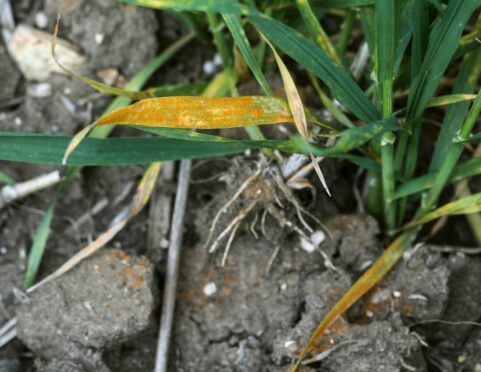With spring around the corner, arable farmers are being warned to act early to stop yellow rust from taking hold.
Those growing susceptible wheat varieties such as Skyfall, Zyatt and Insitor, need to stay particularly vigilant against yellow rust as the risk factors are currently high says Alex Borthwick, commercial technical manager at FMC.
“Yellow rust is a significant disease in wheat crops,” said Mr Borthwick.
“According to AHDB, yield loss of 40-50% can occur in untreated wheat varieties therefore it’s important growers make appropriate fungicide applications early on to prevent the disease from taking hold.”
The yellow rust fungus requires living green plant material to survive and can affect the photosynthetic ability of crops primarily by reducing leaf area.
Mr Borthwick explains that yellow rust thrives in temperatures between 10 to 15 degrees.
“These temperatures are more common as we go through spring but with the mild conditions we’ve already experienced, the disease has appeared early this year.
“It’s therefore important that growers stay vigilant and regularly walk their crops to spot any yellow pustules on the leaves of their crops.”
Mr Borthwick said that fungicide options are fairly limited for treating established yellow rust but you can create a robust preventative fungicide programme, which will tackle later disease development.
He recommends that this programme should include a strobilurin or triazole based product at T0, for the early stages of disease.
“Following this, I’d advise growers use an SDHI product, such as Wolverine at T1,” he said.
“Wolverine contains the SDHI fluxapyroxad and triazole metconazole and can give you good control and good protection against Septoria tritici, reducing the risk of significant yield loss.”
The triazole component in Wolverine, metconazole, offers an alternative option to prothioconazole or tebuconazole at T1.
Fluxapyroxad remains one of the strongest SDHI options for protection against Septoria tritici.
“This ensures that Wolverine offers excellent value and flexibility with good efficacy demonstrated on a wide range of key diseases including eyespot and brown rust,” he said.
Mr Borthwick stressed that yellow rust can appear quickly and unexpectedly but by staying vigilant and creating a timely, targeted application programme, growers can effectively prevent the disease from becoming a problem.
